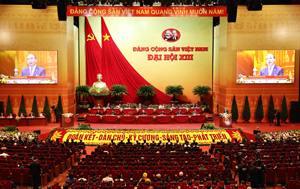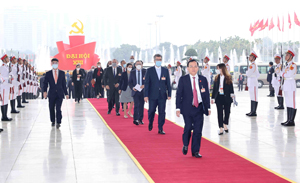
Party General Secretary and State President Nguyen Phu Trong delivers the 12th Party Central Committee’s Political Report and documents to be submitted to the CPV's 13th National Congress.
by Kirtan Bhana
The acknowledgment that the people are at the heart of the developmental success of Vietnam’s emergence is the basis of the 13th National Congress of the Communist Party of Vietnam. The grand opening of the Party’s deliberations was attended by 1,587 delegates that represented more than 5.1 million members at the National Convention Centre in Hanoi, the legendary capital city on January 26, 2021. The delegates will reflect on the outcomes of the renovation of a nation, the policy of Doi Moi (renewal) which transformed the country to follow a path of socialist orientated market economics.
2020 can be considered the most challenging year in the build up to the 13th National Congress. As the viral Covid-19 pandemic spread across the world it has caused many deaths and affected the health of many more. Further, it has affected human activity, and in some instances, brought it to a complete standstill. The pandemic has impacted the livelihoods of many people as global value chains have been disrupted and some totally destroyed. Vietnam’s response to the pandemic has been exemplary and commended by the World Bank for acting with urgency to reduce the spread of the virus and minimizing deaths and illness caused by the virus even though it shares a border with China, where the virus was first discovered.

Photo: Prime Minister Nguyen Xuan Phuc, on behalf of the Presidium delivers the Congress’s opening speech.
Economic growth in Vietnam was calculated at 2.91%, the second highest in the world even as the disease sent other advanced economies into a tailspin with many registering negative double digit growth figures. This can be attributed to the governance of the Party and the will, discipline and resilience of the Vietnamese people and their trust in the leadership. Current Prime Minister of the country Mr Nguyễn Xuân Phúc described the Party as the vanguard of the working class in his opening address to the Congress. He had high praise for his compatriots for the harmony and political stability that makes implementation of policy possible and that has placed the country in line with high levels of foreign direct investment (FDI) which reached U$16.1 billion in 2019 according to the UNCTAD report of 2020.
The International Monetary Fund (IMF) projection for Vietnam’s rate of growth for 2021 is 6.7% and per capita income is set to increase to U$ 2900 according to some reports. Through synchronising infrastructure, industrialisation and modernization and combining production with market, Vietnamese manufactured goods can be found in over 200 countries and regions around the world. The role of the Party in extending, increasing international relations and developing new partnerships through various bilateral and multilateral forums has boosted the country’s global geo-political status.
 Photo: Foreign delegates attend the Congress's opening ceremony
Photo: Foreign delegates attend the Congress's opening ceremony
In Hanoi the International Convention Centre is a coordinated hive of activity as party officials review the outcomes of the 12th Congress. The reports compiled by the Party Central Committees are being deliberated, focussing on common and basic issues and highlighting major policy matters for discussion and decisions. State President Nguyen Phu Trong and Secretary General of the Party in charge of reports presented his comprehensive remarks, stating the sub committees had close coordination with all sectors, agencies and local administrations.
Vietnam has been ranked among the top 10 fastest growing countries in the world over the past five years and is one of the 16 most successful emerging economies. In 2020, the opening up of the Vietnamese economy has resulted in the creation of more than 8 million new jobs and average income increased by nearly 145%. Vietnam is also recognized as becoming a “manufacturing hub” in the Asia-Pacific region as it takes 4th spot in economic size in the ASEAN region.
A diversification of commercial and business activity has meant the need for a dynamic and high quality workforce, incentivising special talents and abilities. This linked with improving the quality of training has not only retained skill within its borders but has attracted new expertise and competence to the country. These variables have prepared the country for international economic integration with several trade areas and regional blocs like the CPTPP, EVFTA, EVIPA and RCEP to name a few of the 14 agreements that were concluded. RCEP, the Regional Comprehensive Economic Partnership, launched in November 2020 in Vietnam will become the world’s largest free trade area once implemented.
The report also points to Vietnam’s proactive role as the Chair of the 10 nation ASEAN regional cooperation body. It discusses the leadership role in efforts to cope with the Covid-19 pandemic, the building of solidarity and consensus and reiterated its stance in settling the dispute of the South China Sea through respecting the international law of the sea, the United Nations Convention on the Law of the Sea (UNCLOS) 1982, and avoiding actions that increase tension and military intervention.
The 13th National Congress will lay out a framework and direction for Vietnam’s development over the next five years as it heads towards the 14th National Congress, and the new elected leadership will have to implement the decisions taken. Key to this is the 3,260km coastline that has 44 sea ports to drive Vietnam’s path to develop into a significant maritime nation by 2030.
Considering that 80% of Vietnam’s population were only born after the war, the 13th National Congress will have to realign its policies to the needs of the youth. In a rapidly transitioning world the youth will have to be equipped with overcoming the many challenges that arise. Ecological and environmental friendly and sustainable practices are becoming the norm. Natural health and wellness awareness are being sought after, combining contemporary medicine with traditional indigenous knowledge and practices. As self-reliance as a nation becomes central to its wellbeing, it also resonates with the self-sufficiency of individual citizens. Changing consumption habits, diversity in connection, communication and information access is leading to, integrated monetary exchange mechanisms and the creation of innovative revenue streams generated from enterprising digital platforms and applications. This is well noted in reports and bodes well for Vietnam’s preparedness for the new industrial revolution (4IR).
Kirtan Bhana is a Director at The Diplomatic Society and Board member at the World Innovation Trophy - Diplomatic World Institute. He thanks the Communist Party of Vietnam for the invitation to cover the 13th National Congress and to participate virtually.
